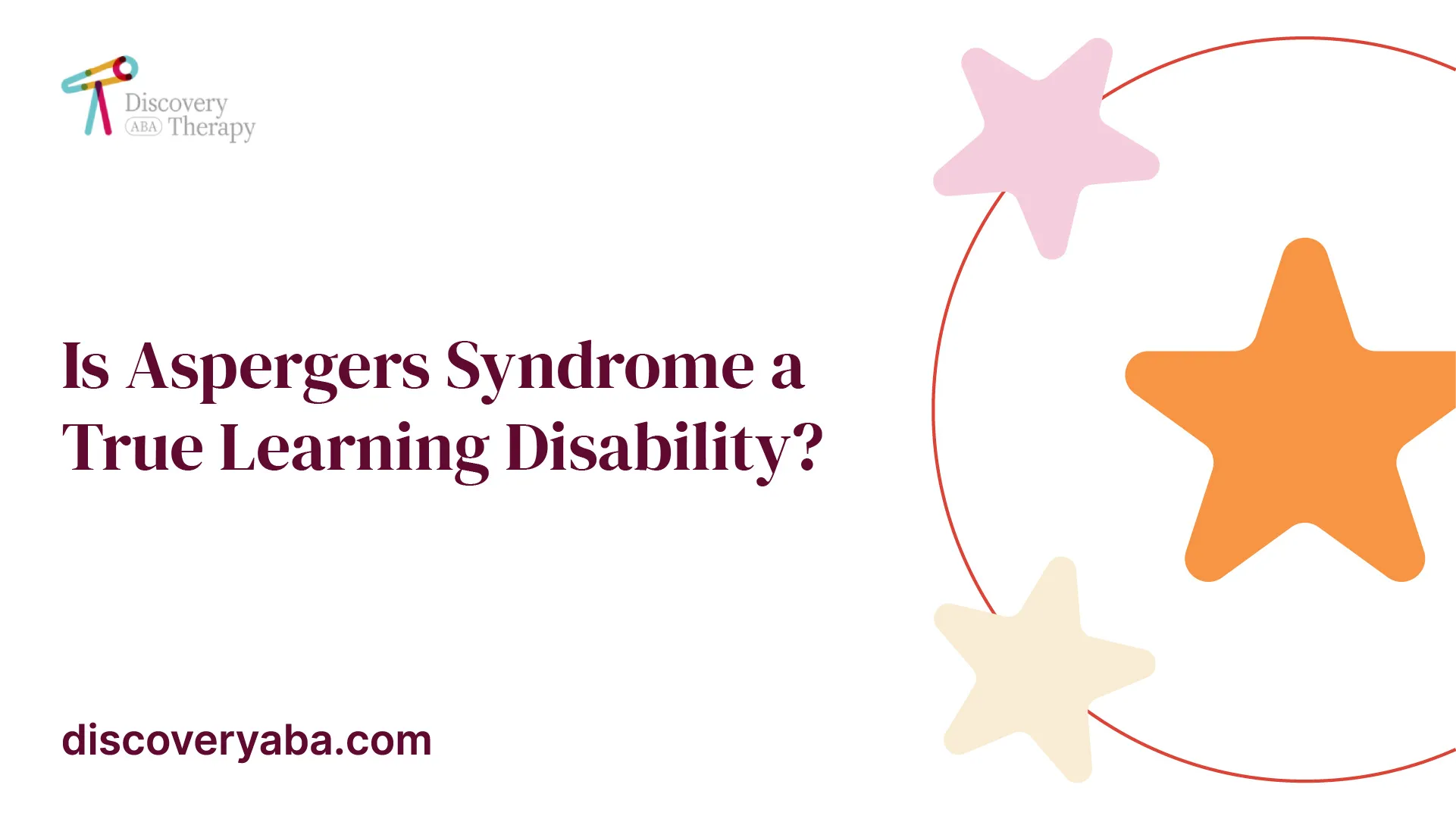Is Aspergers Syndrome a True Learning Disability?
Unveiling the truth: Is Asperger's syndrome a genuine learning disability? Explore the characteristics, education support, and living with Asperger's.

Is Asperger's Syndrome a Learning Disability?
Asperger's syndrome, a developmental disorder, is often associated with challenges in socializing and communicating effectively with others. However, it is important to note that Asperger's syndrome is not considered a learning disability. In this section, we will delve into a better understanding of Asperger's syndrome and differentiate it from learning disabilities.
Understanding Asperger's Syndrome
Asperger's syndrome is a neurodevelopmental condition characterized by difficulties in social interaction, communication, and the presence of repetitive behaviors and narrow interests. People with Asperger's syndrome may find it challenging to engage in reciprocal conversations, understand sarcasm or humor, and may take language literally. These individuals often have average to above-average intelligence levels.

Differentiating Learning Disabilities and Asperger's Syndrome
Although Asperger's syndrome is not a learning disability, individuals with this condition may experience challenges in certain areas of learning. Learning disabilities are specific disorders that impact an individual's ability to acquire, process, or use information effectively. In contrast, Asperger's syndrome primarily affects social interaction, communication, and behavior.
While individuals with Asperger's syndrome may struggle with aspects of learning, such as following multi-step directions, organizing tasks, or completing assignments, they often exhibit strengths in specific areas. For example, they might excel in subjects or fields that require deep factual knowledge or adherence to set rules, such as math, science, or music. It is essential to recognize that the challenges faced by individuals with Asperger's syndrome are distinct from those associated with learning disabilities.
To support individuals with Asperger's syndrome in their educational journey, tailored support and accommodations are often provided. These accommodations may include individualized education plans (IEPs) that address their specific needs, such as social skills development, communication support, and academic modifications. Specialized teaching methods that cater to their unique learning styles can also contribute to their academic success.
Understanding the distinction between Asperger's syndrome and learning disabilities is crucial for providing appropriate support and creating inclusive environments that allow individuals with Asperger's syndrome to thrive academically and socially. While Asperger's syndrome presents its own set of challenges, recognizing and nurturing the strengths of individuals with this condition can help them lead fulfilling lives.
Characteristics of Asperger's Syndrome
Asperger's syndrome is a developmental disorder that affects individuals' ability to socialize and communicate effectively with others. While it is not a learning disability, it presents unique challenges in various areas. Let's explore the key characteristics of Asperger's syndrome, including social interaction challenges, communication difficulties, and repetitive behaviors with narrow interests.
Social Interaction Challenges
Individuals with Asperger's syndrome often struggle with social interactions, finding it challenging to understand social cues and nonverbal communication. Some common social interaction challenges include:
- Difficulty maintaining eye contact
- Challenges in understanding sarcasm, humor, or figurative language
- Difficulty initiating or maintaining reciprocal conversations
- Limited understanding of social norms and expectations
These challenges can lead to difficulties in forming and maintaining friendships and may result in social isolation.
Communication Difficulties
Communication difficulties are another hallmark of Asperger's syndrome. People with Asperger's syndrome may find it challenging to understand and use language effectively. Some communication difficulties associated with Asperger's syndrome include:
- Literal interpretation of language, leading to difficulties understanding idioms or metaphors
- Monotonous or formal speech patterns
- Difficulty with turn-taking in conversations
- Limited use of nonverbal communication, such as facial expressions and gestures
These communication challenges can impact individuals' ability to express themselves and understand others in social and academic settings.
Repetitive Behaviors and Narrow Interests
Repetitive behaviors and narrow interests are common characteristics of Asperger's syndrome. Individuals may engage in repetitive movements, such as hand-flapping or body rocking, as a way to self-soothe or manage anxiety. Additionally, they may develop intense interests in specific topics or subjects, often becoming highly knowledgeable in those areas.
These narrow interests can become a source of strength and expertise for individuals with Asperger's syndrome. However, they can also limit their ability to engage in a variety of activities and may interfere with social interactions and academic pursuits.
Understanding the characteristics of Asperger's syndrome is crucial for providing appropriate support and accommodations to individuals with this condition. By recognizing and addressing the challenges related to social interactions, communication, and repetitive behaviors, we can help individuals with Asperger's syndrome navigate their daily lives more effectively and foster their unique strengths.
Intelligence and Academic Abilities in Asperger's Syndrome
Understanding the intelligence and academic abilities of individuals with Asperger's Syndrome is essential in exploring the relationship between this condition and learning disabilities.
Average to Above-Average Intelligence
Individuals with Asperger's Syndrome often exhibit average to above-average intelligence levels. This means that they have the cognitive capacity to understand and process information at a similar level to their peers. It's important to recognize that intelligence is not directly related to the presence or absence of learning disabilities.
Strengths in Specific Areas
While individuals with Asperger's Syndrome may experience challenges in certain areas, they may also have strengths in specific subjects or fields. Some individuals excel in subjects that require deep factual knowledge or adherence to set rules, such as mathematics, science, or music. These areas of specialization can be a source of pride and accomplishment for individuals with Asperger's Syndrome.
Learning Differences and Challenges
Although individuals with Asperger's Syndrome possess average to above-average intelligence, they may still face specific learning differences and challenges. These challenges can vary from person to person and may include difficulties with social interaction, communication, and repetitive behaviors. These factors can affect the way individuals with Asperger's Syndrome engage with academic tasks and interact within educational settings.
It is important to provide tailored support and accommodations to address these learning differences and challenges. Individualized Education Plans (IEPs) and specialized teaching methods can help create a supportive learning environment that caters to the unique needs of individuals with Asperger's Syndrome. By recognizing and addressing these challenges, individuals can receive the necessary support to thrive academically.
Understanding the intelligence and academic abilities of individuals with Asperger's Syndrome is crucial in dispelling misconceptions surrounding learning disabilities. While some challenges may exist, it is essential to focus on the strengths and potential of individuals with Asperger's Syndrome, fostering an inclusive educational environment that supports their unique learning needs.
Educational Support for Individuals with Asperger's Syndrome
While Asperger's syndrome is not classified as a learning disability, many individuals with Asperger's benefit from educational support and accommodations tailored to their specific needs in order to succeed academically. Understanding and addressing the unique challenges faced by individuals with Asperger's in an educational setting is essential for their overall development and educational success.
Tailored Support and Accommodations
Individuals with Asperger's syndrome may require tailored support and accommodations to help them navigate social situations, develop communication skills, and improve their academic performance. Some examples of tailored support and accommodations include:
- Social Skills Training: Providing social skills training can help individuals with Asperger's develop effective communication strategies, understand social cues, and foster meaningful relationships.
- Visual Aids and Schedules: Using visual aids, such as visual timetables and schedules, can enhance organization and help individuals with Asperger's manage their time and tasks effectively.
- Sensory Support: Sensory sensitivities are common among individuals with Asperger's. Providing sensory support, such as noise-canceling headphones or a quiet space, can help manage sensory overload in the classroom.
Individualized Education Plans (IEPs)
Individualized Education Plans (IEPs) are an essential tool in supporting individuals with Asperger's syndrome in an educational setting. IEPs are personalized plans that outline specific goals, accommodations, and support services tailored to meet the individual's unique needs. Some components of an IEP for a student with Asperger's may include:
- Specific Learning Goals: Clearly defining the academic goals and objectives to be achieved by the student.
- Accommodations and Modifications: Outlining the necessary accommodations, such as extended time for assignments or exams, preferential seating, or modified assignments to ensure the student's success.
- Support Services: Identifying support services such as speech therapy, occupational therapy, or counseling that may be beneficial for the student's overall development.
Specialized Teaching Methods
Utilizing specialized teaching methods can greatly enhance the learning experience for individuals with Asperger's syndrome. Some effective teaching strategies for individuals with Asperger's include:
- Clear and Structured Instructions: Providing clear, concise, and step-by-step instructions can help individuals with Asperger's understand and complete tasks more effectively.
- Visual Supports: Incorporating visual aids, such as charts, diagrams, and graphic organizers, can aid in comprehension and organization of information.
- Utilizing Special Interests: Leveraging an individual's special interests can increase engagement and motivation in the learning process. It can be used as a tool for teaching various subjects and connecting with the individual.
By implementing tailored support and accommodations, creating individualized education plans (IEPs), and utilizing specialized teaching methods, individuals with Asperger's syndrome can receive the necessary support to thrive academically. It is important to recognize and nurture their unique strengths and provide an inclusive educational environment that promotes their overall growth and success.
Living with Asperger's Syndrome
Living with Asperger's Syndrome can present unique challenges and opportunities. Individuals with Asperger's often have the potential to live independently, hold employment, and make valuable contributions to society with the right support and accommodations. It is important to recognize the mental health considerations and unique strengths associated with this condition.
Independent Living and Employment
Contrary to common misconceptions, many individuals with Asperger's Syndrome can live independently and thrive in the workforce when provided with appropriate support and accommodations. Although social interactions and communication may pose challenges, individuals with Asperger's can learn strategies to navigate these difficulties and develop fulfilling relationships. Psychologist Tony Attwood, an expert on Asperger's Syndrome, describes it as "a different way of approaching life, one that is dominated by the pursuit of knowledge and truth" and attributes great advances in science and art to people with Asperger's Syndrome.
Mental Health Considerations
Individuals with Asperger's Syndrome often face mental health challenges due to the difficulties they encounter in daily life. These challenges can lead to feelings of isolation, depression, anxiety, and low self-esteem [4]. It is essential to provide appropriate support and interventions to address these concerns and promote overall well-being. Access to mental health resources, counseling, and support groups can be beneficial in helping individuals with Asperger's manage their mental health effectively.
Recognizing Unique Strengths
Although individuals with Asperger's Syndrome may face certain difficulties, they often possess unique strengths that can be harnessed and celebrated. Attention to detail, strong memory, and expertise in specific subjects are among the notable strengths commonly observed in individuals with Asperger's [5]. These strengths can be utilized in various fields, including science, technology, engineering, and the arts. By recognizing and nurturing these strengths, individuals with Asperger's can make valuable contributions to society.
It is important to remember that while Asperger's Syndrome is not classified as a learning disability, individuals with this condition may experience challenges in many areas of learning due to difficulties with social interactions, communication, and reading social cues. Providing tailored educational support and accommodations, such as individualized education plans (IEPs) and specialized teaching methods, can help individuals with Asperger's overcome these challenges and reach their full potential.
Living with Asperger's Syndrome requires understanding, support, and acceptance. By promoting awareness, advocating for appropriate resources, and recognizing the unique strengths of individuals with Asperger's, we can foster an inclusive society that appreciates the diversity and contributions of all its members.
Asperger's Syndrome and Autism Spectrum Disorder
Asperger's syndrome is considered a form of autism and falls within the autism spectrum disorder (ASD). This section explores the relationship between Asperger's syndrome and autism, the impact on cognitive abilities and brain functions, and the importance of early diagnosis and intervention.
Relationship Between Asperger's Syndrome and Autism
Asperger's syndrome is a subtype of autism spectrum disorder (ASD) characterized by challenges in social interactions, communication, and behavior. Individuals with Asperger's syndrome often experience difficulties in understanding and interpreting social cues, making it challenging to navigate social situations. They may also exhibit repetitive behaviors and have narrow interests.
While there are similarities between Asperger's syndrome and other forms of autism, one key distinction is that individuals with Asperger's syndrome typically have average to above-average intelligence and near-normal language development. However, it is important to note that every individual with Asperger's syndrome is unique, and the severity of symptoms can vary.
Impact on Cognitive Abilities and Brain Functions
Research has shown that there are age-related differences in brain structure and volume in individuals with Asperger's syndrome compared to those without the condition. For example, the volume of cerebral hemispheres and caudate nuclei may alter more with age in individuals with Asperger's syndrome.
It is worth mentioning that males are more commonly diagnosed with Asperger's syndrome than females, with a prevalence rate of approximately 4:1. However, there may be cases where the prevalence rate is closer to 2:1. There are also behavioral and cognitive differences between males and females with Asperger's syndrome, including variances in emotion recognition tasks, theory of mind, and neural structure and function.
Importance of Early Diagnosis and Intervention
Early diagnosis and intervention play a crucial role in supporting individuals with Asperger's syndrome. Identifying the condition early allows for timely interventions and tailored support to address the specific challenges faced by individuals with Asperger's syndrome.
Early intervention can help individuals develop social skills, improve communication abilities, and manage behavioral challenges. It also provides opportunities for individuals with Asperger's syndrome to maximize their strengths and reach their full potential.
With appropriate support and understanding, individuals with Asperger's syndrome can lead fulfilling lives and make valuable contributions to society. It is essential to promote acceptance, create inclusive environments, and provide resources and support to empower individuals with Asperger's syndrome to thrive.
Understanding the relationship between Asperger's syndrome and autism, the impact on cognitive abilities and brain functions, and the significance of early diagnosis and intervention is key to fostering a more inclusive society that embraces neurodiversity.
References
- https://www.medicalnewstoday.com/articles/325483
- https://www.healthline.com/health/aspergers-vs-autism
- https://www.medicinenet.com/characteristicsandsymptomsofaspergers/article.htm
- https://www.learningdisabilities.org.uk/learning-disabilities/a-to-z/a/asperger-syndrome
- https://www.webmd.com/brain/autism/mental-health-aspergers-syndrome
- https://www.ncbi.nlm.nih.gov/pmc/articles/PMC5691167/
Does Your Child Have An Autism Diagnosis?
Learn More About How ABA Therapy Can Help
Find More Articles
Contact us
North Carolina, Nevada, Utah, Virginia
New Hampshire, Maine
Arizona, Colorado, Georgia, New Mexico, Oklahoma, Texas
.avif)




































































































